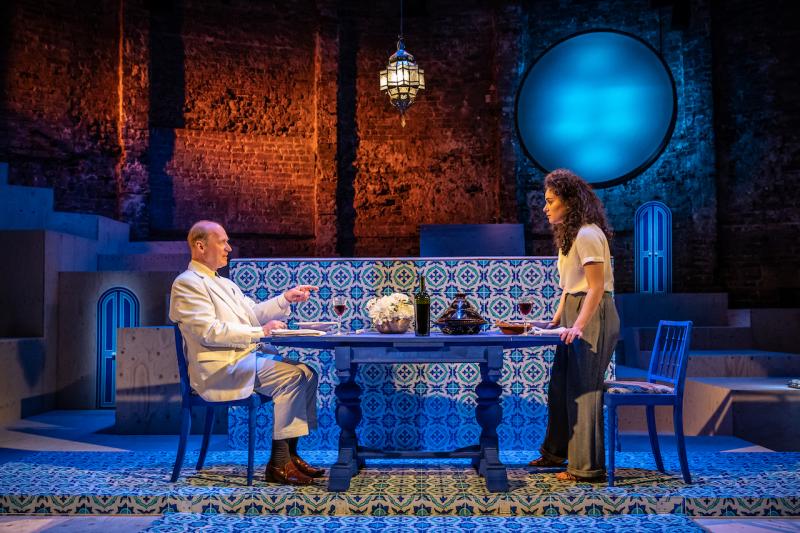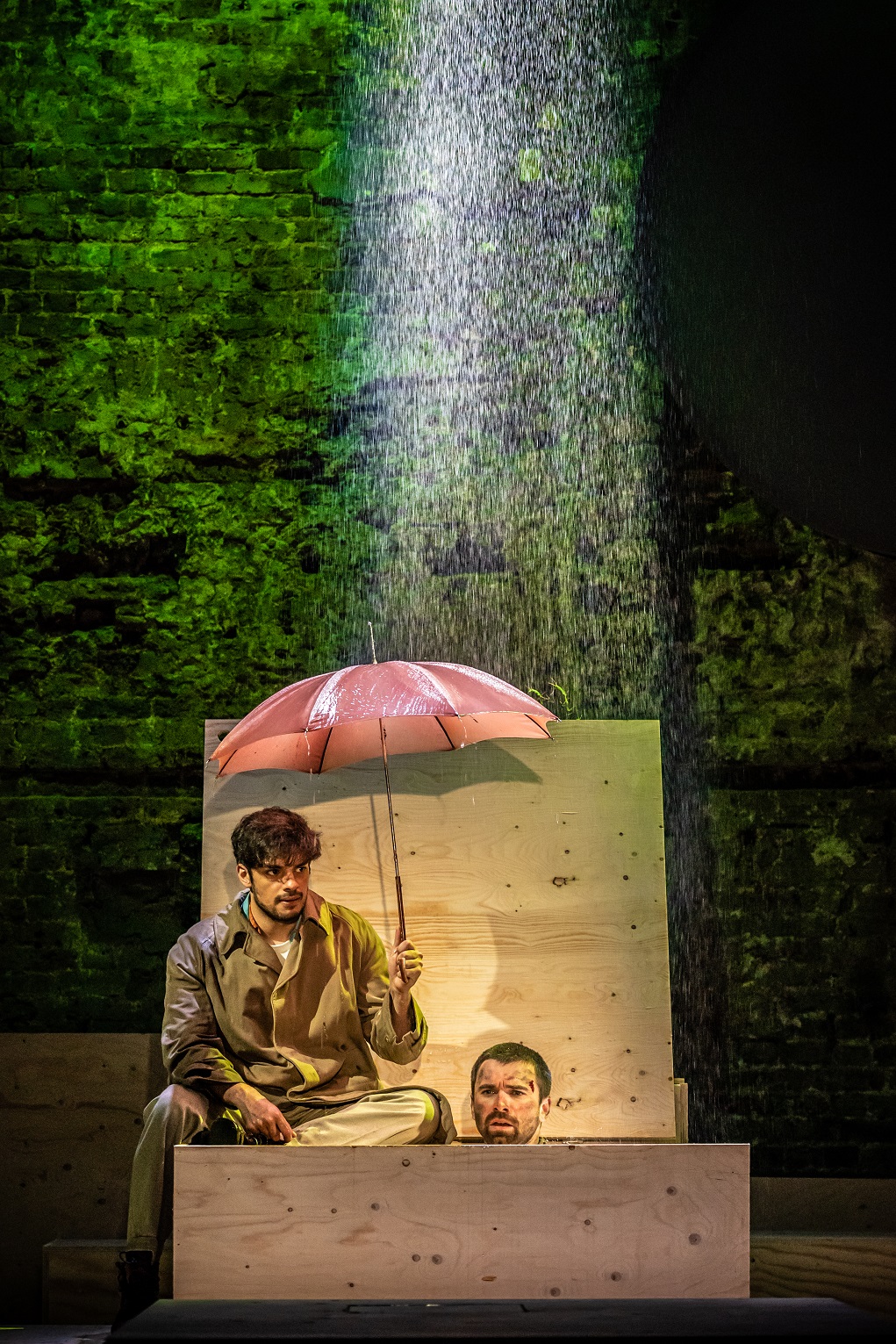Once Upon A Time In Nazi Occupied Tunisia, Almeida Theatre review - flawed theatre but a great experiment | reviews, news & interviews
Once Upon A Time In Nazi Occupied Tunisia, Almeida Theatre review - flawed theatre but a great experiment
Once Upon A Time In Nazi Occupied Tunisia, Almeida Theatre review - flawed theatre but a great experiment
Playwright Josh Azouz's absurdism owes as much to Sacha Baron Cohen as to Beckett

An ageing Nazi, stuffed into a slightly too tight white linen suit, sits at the opposite end of the dining table to a young Jewish woman. Between them is a dish of chicken stew that we, just moments beforehand, have seen her lace with poison.
The tone is darkly comic – "I’ve dreamed about killing Nazis," she tells him. Drily he replies, "Do you want to talk about that?" Still he eats the stew, declaring "Poison can make you foam at the mouth, bleed from the eyes." There is a chilling silence. "In that way it’s very similar to gas."
Playwright Josh Azouz – who is descended from Sephardic Jews – has chosen to explore the Vichy occupation of North Africa with an absurdism that owes as much to Sacha Baron Cohen as it does to Samuel Beckett. As he revealed to the Jewish Chronicle, as so often with horrific political situations, it was not difficult to find comedic anomalies. "When I was reading memoirs from the camps in Tunisia, the Nazis had names like Grandma and Little Feller and Memento… I would read that the Nazis would have to keep rotating the Arab guards because they were getting too friendly with the Jews."
Eleanor Rhode’s production, which plays out on a set where staggered wooden boxes create an abstract desert, opens with a scene in which the Jewish Victor (Pierro Niel-Mee) is buried up to his neck in the sand. So far, so Samuel Beckett. Ethan Kai’s Arab guard, Youssef walks on and tells him he’s been instructed to urinate on his face. When the first attempt at urination fails, a conversation unfolds in which, crucially, we learn that Youssef and Victor have a friendship that long predates the prisoner camp. (Pictured below, Ethan Kai with Pierro Niel-Mee)
It’s an arresting piece of star-casting to have Adrian Edmondson playing the Nazi commander who presides over the banality of evil on display here. Fascinatingly he brings none of the manic violent energy that made him famous as Vyvyan in The Young Ones or Eddie Hitler in Bottom. Instead he interrogates the world around him with a gently bitter bug-eyed sadism. Nicknamed “Grandma” because of his knitting habit, he is the embodiment of grotesque political cynicism disguised by privilege and charm. In what feels like a particularly contemporary jab, one character shouts: “You’ve got a nice accent, that’s probably why you’ve got away with talking so much shit for so long.”
 Azouz’s play feels like a fantastic experiment, but he is – ironically – slightly undermined by how fascinating and largely unknown the real detail of his subject matter is. Absurdism works best in a context when the audience members are thoroughly familiar with the minutiae of the political or religious system being subverted.
Azouz’s play feels like a fantastic experiment, but he is – ironically – slightly undermined by how fascinating and largely unknown the real detail of his subject matter is. Absurdism works best in a context when the audience members are thoroughly familiar with the minutiae of the political or religious system being subverted.
Yet it’s still a surprise to many people that German attempts to collaborate with Muslims date back as far as World War I, when Kaiser Wilhelm II declared himself the great friend of the Ottoman Empire and led an active campaign to foment jihad against the British and French. Here World War II’s Vichy occupation of Tunisia is used as a way of exploring several issues. These range from the impact of the Nazi occupation on the friendship of Victor and Youssef and their wives to the stridently controversial comparison of Nazi anti-Semitism to Muslim attitudes to the Jews. Another – underexplored – question is the degree to which the Tunisians might have felt that perhaps their treatment at the hands of the Nazis was better than what they had experienced under the French.
A few days after press night it felt like the younger cast members were becoming more comfortable with the significant shifts in tone demanded by their roles. Often the jauntiness grates, but as the emotional stakes are raised Yasmin Paige, playing Victor’s wife Loys (main picture, with Adrian Edmondson), in particular brings a gravitas and outrage that makes the humour spark far better.
It’s refreshing to see Azouz wrestling with this kind of subject matter, and at a time when political extremists – not least in France – are vying to produce palatable versions of hate for their own gain, the questions he raises are important. Yet this is flawed theatre – a great experiment, but not the breakthrough work that will no doubt one day make this playwright a big name.
The future of Arts Journalism
You can stop theartsdesk.com closing!
We urgently need financing to survive. Our fundraising drive has thus far raised £49,000 but we need to reach £100,000 or we will be forced to close. Please contribute here: https://gofund.me/c3f6033d
And if you can forward this information to anyone who might assist, we’d be grateful.

Subscribe to theartsdesk.com
Thank you for continuing to read our work on theartsdesk.com. For unlimited access to every article in its entirety, including our archive of more than 15,000 pieces, we're asking for £5 per month or £40 per year. We feel it's a very good deal, and hope you do too.
To take a subscription now simply click here.
And if you're looking for that extra gift for a friend or family member, why not treat them to a theartsdesk.com gift subscription?
more Theatre
 That Bastard, Puccini!, Park Theatre review - inventive comic staging of the battle of the Bohèmes
James Inverne enjoyably reconstructs the rivalry between Puccini and Leoncavallo
That Bastard, Puccini!, Park Theatre review - inventive comic staging of the battle of the Bohèmes
James Inverne enjoyably reconstructs the rivalry between Puccini and Leoncavallo
 Till the Stars Come Down, Theatre Royal Haymarket review - a family hilariously and tragically at war
Beth Steel makes a stirring West End debut with her poignant play for today
Till the Stars Come Down, Theatre Royal Haymarket review - a family hilariously and tragically at war
Beth Steel makes a stirring West End debut with her poignant play for today
 Nye, National Theatre review - Michael Sheen's full-blooded Bevan returns to the Olivier
Revisiting Tim Price's dream-set account of the founder of the health service
Nye, National Theatre review - Michael Sheen's full-blooded Bevan returns to the Olivier
Revisiting Tim Price's dream-set account of the founder of the health service
 Girl From The North Country, Old Vic review - Dylan's songs fail to lift the mood
Fragmented, cliched story rescued by tremendous acting, singing and music
Girl From The North Country, Old Vic review - Dylan's songs fail to lift the mood
Fragmented, cliched story rescued by tremendous acting, singing and music
 The Merry Wives of Windsor, Shakespeare's Globe review - hedonistic fizz for a summer's evening
Emma Pallant and Katherine Pearce are formidable opponents to Falstaff's buffoonery
The Merry Wives of Windsor, Shakespeare's Globe review - hedonistic fizz for a summer's evening
Emma Pallant and Katherine Pearce are formidable opponents to Falstaff's buffoonery
 Run Sister Run, Arcola Theatre review - emphatic emotions, overwrought production
Chloë Moss’s latest play about the different lives of two sisters is deeply felt
Run Sister Run, Arcola Theatre review - emphatic emotions, overwrought production
Chloë Moss’s latest play about the different lives of two sisters is deeply felt
 Intimate Apparel, Donmar Warehouse review - stirring story of Black survival in 1905 New York
An early Lynn Nottage work gets a superb cast and production
Intimate Apparel, Donmar Warehouse review - stirring story of Black survival in 1905 New York
An early Lynn Nottage work gets a superb cast and production
 Hercules, Theatre Royal Drury Lane review - new Disney stage musical is no 'Lion King'
Big West End crowdpleaser lacks punch and poignancy with join-the-dots plotting and cookie-cutter characters
Hercules, Theatre Royal Drury Lane review - new Disney stage musical is no 'Lion King'
Big West End crowdpleaser lacks punch and poignancy with join-the-dots plotting and cookie-cutter characters
 Showmanism, Hampstead Theatre review - lip-synced investigation of words, theatricality and performance
Technically accomplished production with Dickie Beau never settles into a coherent whole
Showmanism, Hampstead Theatre review - lip-synced investigation of words, theatricality and performance
Technically accomplished production with Dickie Beau never settles into a coherent whole
 4.48 Psychosis, Royal Court review - powerful but déjà vu
Sarah Kane’s groundbreaking play gets a nostalgic anniversary reboot
4.48 Psychosis, Royal Court review - powerful but déjà vu
Sarah Kane’s groundbreaking play gets a nostalgic anniversary reboot
 Joyceana around Bloomsday, Dublin review - flawless adaptations of great dramatic writing
Chapters and scenes from 'Ulysses', 'Dubliners' and a children’s story vividly done
Joyceana around Bloomsday, Dublin review - flawless adaptations of great dramatic writing
Chapters and scenes from 'Ulysses', 'Dubliners' and a children’s story vividly done

Add comment